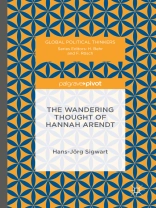This book interprets Hannah Arendt’s work as a “wandering” type of political theory. Focusing on the sub-text of Arendt’s writings which questions “how to think” adequately in political theory whilst categorically refraining from explicitly investigating meta-theoretical questions of epistemology and methodology, the book characterizes her theorizing as an oscillating movement between the experiential positions of philosophy and politics, and by its distinctly multi-contextual perspective. In contrast to the “not of this world” attitude of philosophy, the book argues that Arendt’s political theory is “of this world”. In contrast to politics, it refrains from being “at home” in any particular part of this world and instead wanders between the multiple horizons of the many different political worlds in time and space. The book explores how these two decisive motives of Arendt’s theoretical self-perception majorly influence her epistemological, methodological and normative frame of reference and inspire her understanding of major concepts, including politics, judgment, understanding, nature, and space.
Inhoudsopgave
Introduction.- Chapter 1. Defending Politics against Philosophy.- Chapter 2. The Realms of Necessity and of Utility.- Chapter 3. The Practice of Politics .- Chapter 4. The Epistemology of Politics .- Chapter 5. The Experiential Position of Political Theory.- Chapter 6. The Limits of Political Horizons and the Vocation of Theoretical Wandering.
Over de auteur
Hans-Jörg Sigwart is Senior Lecturer in Political Theory at the University of Erlangen-Nuremberg, Germany. He has held guest professorships, fellowships and research visits at Central European University, Budapest, Hungary; Duke University, USA; Hoover Institute at Stanford University, USA; Louisiana State University USA; University of Darmstadt, Germany; and, University of Damascus, Syria. His publications include books on the political thought of Hannah Arendt, John Dewey, and Eric Voegelin.












